完整word版七年级下册一般过去时讲解及练习题
(完整word版)初一下一般过去时讲解及训练

初一过去时讲解及训练一般过去时1.一般过去时表示过去某个时间发生的动作或存在的状态,常和表示过去的时间状语连用。
一般过去时也表示过去经常或反复发生的动作。
常用过去时间:yesterday, this morning, just now, a moment ago, in May, last night / year / week, once upon a time, the other day, before …, when –clause, in the past连用。
如:What did you do yesterday? 昨天你干了什么?I met Lin Tao this morning. 今天上午我会到了林涛。
I was there a moment ago. 刚才我在那儿2.Be动词在一般过去时中的变化:⑴am 和is在一般过去时中变为was。
(was not=wasn't)⑵are在一般过去时中变为were。
(were not=weren't)⑶带有was或were的句子,其否定、疑问的变化和is, am, are一样,即否定句在was或were后加not,一般疑问句把was或were调到句首。
3.句中没有be动词的一般过去时的句子肯定句:Jim went home yesterday.把动词改为过去形式否定句:didn't +动词原形,如:Jim went home yesterday.Jim didn't go home yesterday.一般疑问句:在句首加did,句子中的动词过去式变回原形。
如:Jim went home yesterday.Did Jim go home yesterday?特殊疑问句:⑴疑问词+一般疑问句?如:Jim went home yesterday.Did Jim go home yesterday?What did Jim do yesterday?动词过去式变化规则:(1) 一般在动词后加-ed。
(完整版)初中一般过去时详细讲解与练习
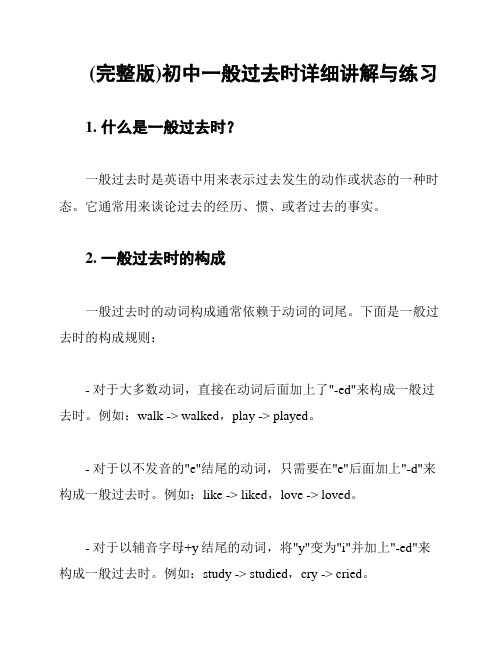
(完整版)初中一般过去时详细讲解与练习1. 什么是一般过去时?一般过去时是英语中用来表示过去发生的动作或状态的一种时态。
它通常用来谈论过去的经历、惯、或者过去的事实。
2. 一般过去时的构成一般过去时的动词构成通常依赖于动词的词尾。
下面是一般过去时的构成规则:- 对于大多数动词,直接在动词后面加上了"-ed"来构成一般过去时。
例如:walk -> walked,play -> played。
- 对于以不发音的"e"结尾的动词,只需要在"e"后面加上"-d"来构成一般过去时。
例如:like -> liked,love -> loved。
- 对于以辅音字母+y结尾的动词,将"y"变为"i"并加上"-ed"来构成一般过去时。
例如:study -> studied,cry -> cried。
- 部分动词的一般过去时需要进行不规则变化。
例如:go -> went,eat -> ate。
3. 一般过去时的用法一般过去时通常用来描述以下情况:- 过去发生的动作:I walked to school yesterday.- 过去的经历:He lived in London for five years.- 过去的事实:She was a teacher in the past.4. 一般过去时的句型练下面是一些练,帮助加深对一般过去时的理解和运用:1. 请用一般过去时填空:Yesterday, I ________ (watch) a movie at home.2. 完成句子:He _____ (visit) his grandparents last summer.3. 改写句子,使用一般过去时:I read a book yesterday. (改为否定句)4. 改写句子,使用一般过去时:They played basketball in the park. (改为疑问句)5. 总结一般过去时是用来表示过去发生的动作或状态的一种时态。
初一下一般过去时讲解及训练(2021年整理)

初一下一般过去时讲解及训练(word版可编辑修改)编辑整理:尊敬的读者朋友们:这里是精品文档编辑中心,本文档内容是由我和我的同事精心编辑整理后发布的,发布之前我们对文中内容进行仔细校对,但是难免会有疏漏的地方,但是任然希望(初一下一般过去时讲解及训练(word版可编辑修改))的内容能够给您的工作和学习带来便利。
同时也真诚的希望收到您的建议和反馈,这将是我们进步的源泉,前进的动力。
本文可编辑可修改,如果觉得对您有帮助请收藏以便随时查阅,最后祝您生活愉快业绩进步,以下为初一下一般过去时讲解及训练(word版可编辑修改)的全部内容。
初一过去时讲解及训练一般过去时1.一般过去时表示过去某个时间发生的动作或存在的状态,常和表示过去的时间状语连用。
一般过去时也表示过去经常或反复发生的动作。
常用过去时间:yesterday, this morning, just now, a moment ago, in May, last night / year / week, once upon a time, the other day, before …, when –clause, in the past连用。
如:What did you do yesterday?昨天你干了什么?I met Lin Tao this morning. 今天上午我会到了林涛.I was there a moment ago。
刚才我在那儿2.Be动词在一般过去时中的变化:⑴am 和is在一般过去时中变为was。
(was not=wasn’t)⑵are在一般过去时中变为were。
(were not=weren’t)⑶带有was或were的句子,其否定、疑问的变化和is, am, are一样,即否定句在was或were后加not,一般疑问句把was或were调到句首.3.句中没有be动词的一般过去时的句子肯定句:Jim went home yesterday。
七年级下册一般过去时讲解及练习题(完整资料).doc
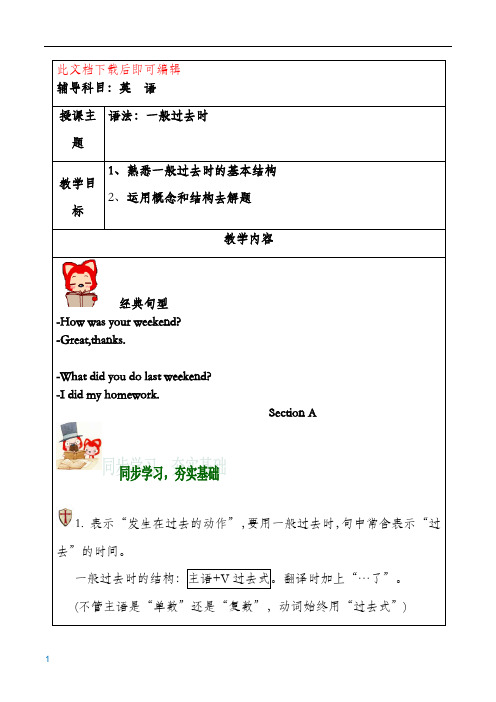
此文档下载后即可编辑辅导科目:英语授课主题语法:一般过去时教学目标1、熟悉一般过去时的基本结构2、运用概念和结构去解题教学内容经典句型-How was your weekend?-Great,thanks.-What did you do last weekend?-I did my homework.Section A1. 表示“发生在过去的动作”,要用一般过去时,句中常含表示“过去”的时间。
一般过去时的结构:主语+V过去式。
翻译时加上“…了”。
(不管主语是“单数”还是“复数”,动词始终用“过去式”)练:(1) He _________ (go) to school on foot yesterday.(2) – What did Jim do?-- He _________ (go) to the movies.(3) We ___________ (not go) to the cinema last Sunday.2. –你上个周末做了什么?-- What did you do last weekend? (did 引导,动词还原)--在星期天上午,我打了网球。
-- I played tennis on Sunday morning.拓展:时间前的介词用什么在上午/下午/晚上:in the morning/afternoon/evening在星期天上午/下午/晚上:on Sunday morning/afternoon/evening 在上个星期天上午:/ last Sunday morning (前不用冠词)在上学的白天/晚上:on school days/nightson weekends 在周末on weekdays 在工作日3. –Tina的周末怎么样?-- How was Tina’s weekend?--它很棒:It was great.–它还不错:It was not bad.–它很糟糕:It was terrible.。
完整word版一般过去时讲解 练习含答案推荐文档
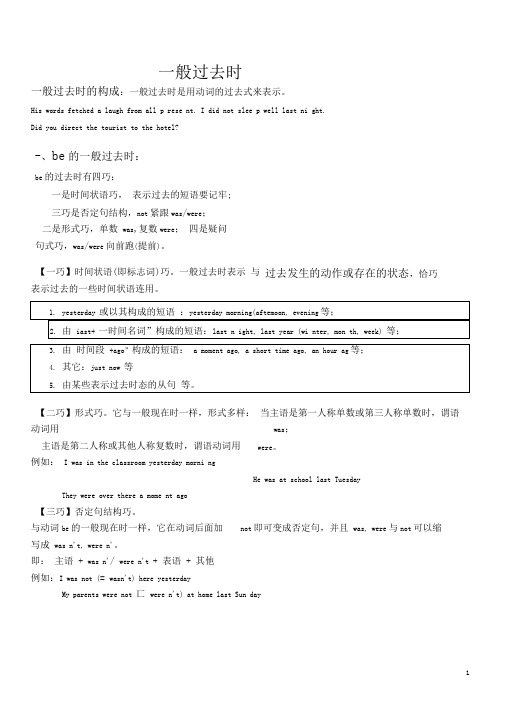
一般过去时一般过去时的构成:一般过去时是用动词的过去式来表示。
His words fetched a laugh from all p rese nt. I did not slee p well last ni ght.Did you direct the tourist to the hotel?-、be 的一般过去时:be 的过去时有四巧:一是时间状语巧, 表示过去的短语要记牢;三巧是否定句结构,not 紧跟was /were ;二是形式巧,单数 was ,复数were ; 四是疑问句式巧,was /were 向前跑(提前)。
【一巧】时间状语(即标志词)巧。
一般过去时表示 与表示过去的一些时间状语连用。
【二巧】形式巧。
它与一般现在时一样,形式多样: 当主语是第一人称单数或第三人称单数时,谓语动词用was ; 主语是第二人称或其他人称复数时,谓语动词用例如: I was in the classroom yesterday morni ngHe was at school last Tuesday They were over there a mome nt ago 【三巧】否定句结构巧。
与动词be 的一般现在时一样,它在动词后面加not 即可变成否定句,并且 was, were 与not 可以缩写成 was n't, were n'。
即: 主语 + was n'/ were n't + 表语 + 其他例如:I was not (= wasn't) here yesterdayMy parents were not 匸 were n't) at home last Sun day 过去发生的动作或存在的状态,恰巧 were 。
【四巧】疑问句式巧。
把was, were提到句首,句末用问号即可变为一般疑问句。
即:Was(Were) + 主语 +表语 + 其他?例如:Were you at home the day before yesterday Was she late this morning? 肯定回答用“ Yes主语+ was/ were. ”;否定回答用“ N主语+ was n'/ were n't. ”例如:--Were Wei Hua and Han Mei here just now? --Yes, they were (No, they were n't .)二、一般过去时的用法(一)一般过去时的基本用法a.表示过去 某个特定时间 发生的动作 或存在的状态例如: He sudde niy fell ill yesterday. The engine stopped because the fuel was used up. 注意:在一般过去时的句子中,通常都要有表示过去的时间状语。
(完整)七年级英语一般过去时详细讲解与练习题学生版
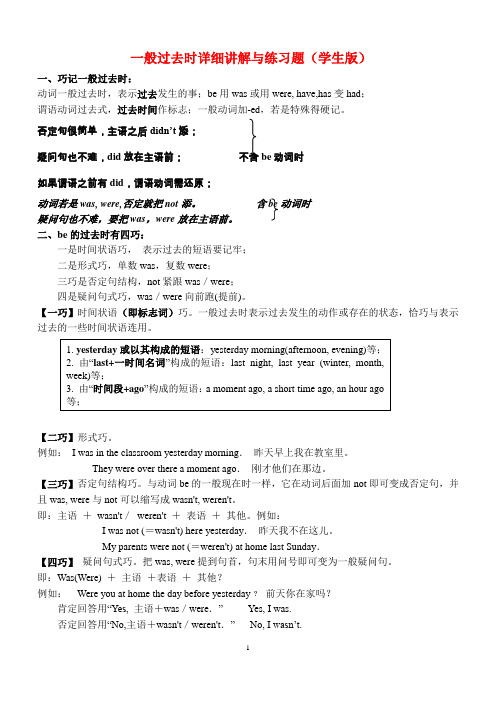
一般过去时详细讲解与练习题(学生版)一、巧记一般过去时:动词一般过去时,表示过去发生的事;be 用was 或用were, have,has 变had ;谓语动词过去式,过去时间作标志;一般动词加-ed ,若是特殊得硬记。
否定句很简单,主语之后didn’t 添;疑问句也不难,did 放在主语前; 不含be动词时如果谓语之前有did ,谓语动词需还原;动词若是was, were,否定就把not 添。
含be 动词时疑问句也不难,要把was ,were 放在主语前。
二、be 的过去时有四巧:一是时间状语巧, 表示过去的短语要记牢;二是形式巧,单数was ,复数were ;三巧是否定句结构,not 紧跟was /were ;四是疑问句式巧,was /were 向前跑(提前)。
【一巧】时间状语(即标志词)巧。
一般过去时表示过去发生的动作或存在的状态,恰巧与表示过去的一些时间状语连用。
【二巧】形式巧。
例如: I was in the classroom yesterday morning . 昨天早上我在教室里。
They were over there a moment ago . 刚才他们在那边。
【三巧】否定句结构巧。
与动词be 的一般现在时一样,它在动词后面加not 即可变成否定句,并且was, were 与not 可以缩写成wasn't, weren't 。
即:主语 + wasn't / weren't + 表语 + 其他。
例如:I was not (=wasn't) here yesterday . 昨天我不在这儿。
My parents were not (=weren't) at home last Sunday .【四巧】 疑问句式巧。
把was, were 提到句首,句末用问号即可变为一般疑问句。
即:Was(Were) + 主语 +表语 + 其他?例如: Were you at home the day before yesterday ﹖ 前天你在家吗?肯定回答用“Yes, 主语+was /were .” Yes, I was.否定回答用“No,主语+wasn't /weren't .” No, I wasn’t.三、一般过去时态精讲1. 用法: ①过去某个时间发生的动作例:His mother made some dumplings yesterday.②过去某个时间存在的状态例:Jim was 12 years old.③过去经常或反复发生的动作例:He often went to swim when he was a child.2. 与一般过去时连用的时间状语常见的有:Yesterday, last night, in 1990, once, two days ago, the day before yesterday ,the other day 几天前3. 一般过去时的四个基本句型4. 动词的过去式和过去分词的规则变化①一般在动词词尾加ed 例: want →wanted②以e结尾的动词,只加d 例: live →lived③以辅音字母加y结尾的动词,改y为i,再加ed 例: study →studied④以重读闭音节结尾,末尾只有一个辅音字母,双写这一辅音字母,再加ed例: stop →stopped一. 单项选择:从下列各题后所给的四个选项中选择最佳答案填空。
(完整版word)英语一般过去时的用法大全含答案解析
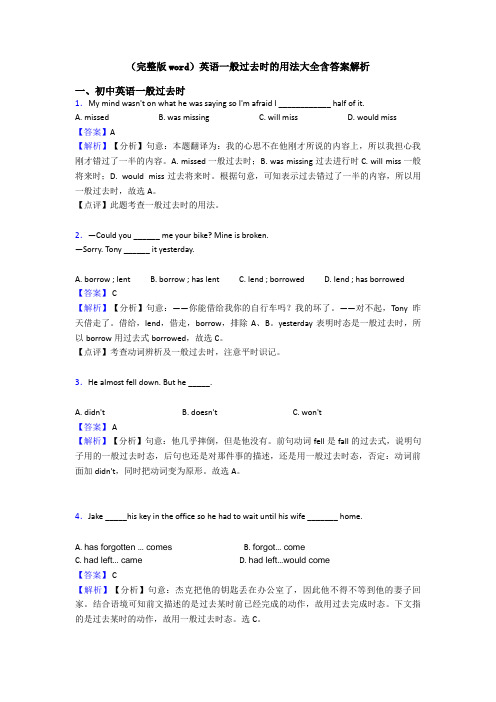
(完整版word)英语一般过去时的用法大全含答案解析一、初中英语一般过去时1.My mind wasn't on what he was saying so I'm afraid I ____________ half of it.A. missedB. was missingC. will missD. would miss【答案】A【解析】【分析】句意:本题翻译为:我的心思不在他刚才所说的内容上,所以我担心我刚才错过了一半的内容。
A. missed一般过去时;B. was missing过去进行时C. will miss一般将来时;D. would miss过去将来时。
根据句意,可知表示过去错过了一半的内容,所以用一般过去时,故选A。
【点评】此题考查一般过去时的用法。
2.—Could you ______ me your bike? Mine is broken.—Sorry. Tony ______ it yesterday.A. borrow ; lentB. borrow ; has lentC. lend ; borrowedD. lend ; has borrowed 【答案】 C【解析】【分析】句意:——你能借给我你的自行车吗?我的坏了。
——对不起,Tony昨天借走了。
借给,lend,借走,borrow,排除A、B。
yesterday表明时态是一般过去时,所以borrow用过去式borrowed,故选C。
【点评】考查动词辨析及一般过去时,注意平时识记。
3.He almost fell down. But he _____.A. didn'tB. doesn'tC. won't【答案】 A【解析】【分析】句意:他几乎摔倒,但是他没有。
前句动词fell是fall的过去式,说明句子用的一般过去时态,后句也还是对那件事的描述,还是用一般过去时态,否定:动词前面加didn't,同时把动词变为原形。
(完整版word)初一年级英语英语一般过去时知识点含答案解析

(完整版word)初一年级英语英语一般过去时知识点含答案解析一、初中英语一般过去时1.—Are you a basketball player in you school?—Yes, I ______the team 3 years ago. I ______in it for 3 years.A. joined, wasB. was joined, amC. have joined, have beenD. joined, have been【答案】D【解析】【分析】句意:——你是你们学校的篮球运动员吗?——是的,我在3年前加入了篮球队。
我已经参加它3年了。
第一空,根据时间状语3 years ago,三年前,可知此处用一般过去时,故为joined。
第二空,根据for 3 years,可知此处用延续性动词的现在完成时,结构为have done,主语是I,故用have been。
故选D。
【点评】考查一般过去时和现在完成时。
注意根据时间状语确定动词的时态。
2.Bella, a young singer, ______ on January, 2015 because of cancer. Her death made us very sad.A. has been deadB. has diedC. was deadD. died【答案】 D【解析】【分析】句意:贝拉,一位年轻的歌手在2015年的1月因为癌症去世了。
她的死叫我们很难过。
根据时间on January, 2015可知用过去式,结合句意和语境应选D。
3.Jake _____his key in the office so he had to wait until his wife _______ home.A. has forgotten … comesB. forgot… comeC. had left… cameD. had left…would come【答案】 C【解析】【分析】句意:杰克把他的钥匙丢在办公室了,因此他不得不等到他的妻子回家。
初中英语一般过去时详解及练习题

一般过去时1.一般过去时表示在过去某一时间发生的动作或存在的状态表示时间的词有:yesterday,this morning/afternoon/evening,last+时间(上个...)last night,last Sunday,last week,last year2.一般过去时的基本结构肯定句式①主语+was/were+其他例句:He was here yesterday.②主语+动词过去式+其他例句:I went to play basketball last Sunday.否定句式①主语+was/were+not+其他例句:She wasn’t at home this morning.②主语+didn’t+动词原形+其他例句:I didn’t find you yesterday..一般疑问句①Was/Were+主语+其他例句:Were you at school last week?②Did+主语+动词原形+其他例句:Did you play football yesterday?特殊疑问句特殊疑问词(如what,why,when,where等)+一般疑问句句式例句:Where were you yesterday?What did you do yesterday?3.动词的过去式规则动词①一般情况下直接在动词后+ed例:work-worked look-looked walk-walked②以e结尾的单词直接+d例:live-lived hope-hoped use-used③以辅音字母+y结尾的,改y为i再+ed例:study-studied carry-carried以元音字母+y,直接+ed例:enjoy-enjoyed play-played⑤以重读、一个辅音字母结尾的闭音节结尾的动词,双写最后的辅音字母+ed例:stop-stopped plan-planned prefer-preferred不规则动词(书本76页表格)动词原形过去式动词原形过去式is/am was do didare were get gotbegin began go wentbuy bought have hadcome came make maderead read see sawrun ran take tookeat ate一般过去时练习题一、写出下列动词的过去式1.is/am_____2.fly_____3.plant_____4.are_____5.drink_____6.play_____7.go_____8.make_____9.do_____10.dance_____11.worry_____12.ask_____13.eat_____14.pass_____二、用所给动词的适当形式填空1.He_____(be)at home last night.2.He_____(visit)the Great Wall last year.3.We_____(have)a good time yesterday.4.We_____(go)to school by bus last year.5.Sam_____(did)the housework yesterday.6._____(do)you______(play)the violin this morning?三、选择题1.The two girls____all in Class1last year.A.areB.wasC.were.D is2.This morning he____a taxi.A.tookB.takesC.take.D is taking3.I_____to school at8o’clock yesterday.A.goB.am goingC.went D goes4.-What did you do last night?-I______a story bookA.readB.readedC.am reading D reads。
(完整word)一般过去时练习

时态训练一般过去时(一)I。
一般过去时:表示过去某个时间里发生的动作或状态;过去习惯性、经常性的动作、行为;过去主语所具备的能力和性格。
基本结构:主语+动词过去式+其他 I was at school yesterday 。
I went to America last year 。
否定形式①was/were+not;②在行为动词前加didn’t,同时还原行为动词I wasn’t at school yesterday 。
I didn’t go to America last year ?一般疑问句:Was/ Were +主语+其他?Were you at school yesterday ?Did+主语+动词原形+其他?Did you go to America last year ?时间状语: then那时 yesterday 昨天 at that time在那个时候last night昨天晚上 last week上周 last month上个月 last year去年(last…上一个…)ago 之前 three days ago三天前 many years ago许多年前规则动词变过去式:1、一般直接+ed:walk---walked play--—played start—--started2、以不发音的e结尾的只+d:live———lived hope--—hoped use-——used3、以“辅音字母+y”结尾的动词,先变“y”为“i”再+ed:study--—studied carry———carried4。
以元音字母+y结尾的,直接加ed:enjoy—-—— enjoyed play——--played4、末尾只有一个辅音字母的重读闭音节词,双写末尾的辅音字母再+ed:drop—-—dropped skip---skipped stop——-stopped4.不规则变化:have/has —-had eat—ate see—saw am/is—was are—were go—wentdo—did take-took run—ran sleep—slept get—got meet-metbring—brought buy—bought think—thought can—could write—wrote read—read tell—told say—said give—gave feel—felt fall—fell teach—taughtmake—made send—sent lose—lost swim—swam drink—drankring-rang win—won put—put cut-cut let—let时态训练一般过去时(二)I.写出下列动词的过去式:get --—-_________ come ———-_________ watch -———_________ have ———-_________am/is --——_________ are ————_________ live—--—_________ talk-—-—_________cook -——-_________ work-——-_________ can -———_________ like—--—_________read-——-_________ write —-——_________ dance-—-—_________ give——--_________teach-—-—_________ study—-——_________ eat ———-_________ drink--——_________bring———-_________ help-——-_________ want —---_________ use—---_________stay ————_________ visit--—-_________ ride--—-_________ take -——-_________climb ----_________ wear---—_________ laugh ——--_________ go--—-_________sleep--—-_________ put--—-_________ borrow ———-_________ wait———-_________send-———_________ tell-——-_________ carry -—--_________ drop——-—_________make —--—_________ finish————_________ run —-——_________ meet--—-_________walk————_________ see-—-—_________ wash —-——_________ bump ——--_________play——--_________ skip-——-_________ ring ——--_________ carry —-—-_________win —--—_________ lose----_________ listen--—-_________ fall -—-—_________photo —--—_________ rain ——-—_________ jump—-——_________ happen----________hope ——-—_________ look ———-_________ stop ——-—_________ swim ——-—_________一般过去时(三)单项选择()1。
(完整word版)英语一般过去时专项练习题(word文档良心出品)

英语一般过去时专项练习1、含义:一般过去时表示过去某个时间发生的动作或存在的状态,常和表示过去的时间状语连用。
一般过去时也表示过去经常或反复发生的动作感谢。
2、Be动词在一般过去时中的变化:⑴am 和is在一般过去时中变为was。
(was not=wasn’t)⑵are在一般过去时中变为were。
(were not=weren’t)⑶带有was或were的句子,其否定、疑问的变化和is, am, are一样,即否定句在was或were后加not,一般疑问句把was或were调到句首。
3、句中没有be动词的一般过去时的句子否定句:didn’t +动词原形,如:Jim didn’t go home yesterday.一般疑问句:在句首加did,句子中的动词过去式变回原形。
如:Did Jim go home yesterday?4.代表词:yesterday, yesterday morning/afternoon/evening, last week/month/year, last summer, last Sunday,…ago, in+过去的时间等的过去时间状语。
特殊疑问句:⑴疑问词+did+主语+动词原形?如:What did Jim do yesterday?⑵疑问词当主语时:疑问词+动词过去式?如:Who went to home yesterday?动词过去式变化规则:1.一般在动词末尾加-ed,如:pull-pulled, cook-cooked2.结尾是e加d,如:taste-tasted3.末尾只有一个元音字母和一个辅音字母的重读闭音节,应双写末尾的辅音字母,再加-ed,如:stop-stopped4.以“辅音字母+y”结尾的,变y为i,再加-ed,如:study-studied5.不规则动词过去式:am,is-was are-were, do-did, see-saw, say-said give-gave, get-got, go-went come-came, have/has-had, eat-ate, take-took, run-ran, sing-sang, put-put,make-made, read-read, write-wrote, draw-drew, drink-drank,fly-flew, ride-rode, speak-spoke, sweep-swept, buy-bought find-foundthink-thought tell-told read-read swim-swam, sit-sat bring--brought can-could cut-cut become-became begin-began draw-drew feel-felt forget-forgot hear-heard keep-kept know-knew write-wrote learn-learnt(learned) leave-left let-letteach-taught lose-lost meet-met sleep-slept speak-spoke take-took一、过去时练习:写出下列动词的过去式is\am_________ fly_______ study________ are ________ drink_________play_______ go________ make ________ does_________ dance________worry________ ask _____ taste_________ eat__________ draw________put ______ have________ stop_________ read_______ do ________二、句型转换。
(word完整版)七年级英语一般过去时详细讲解与练习题人教版
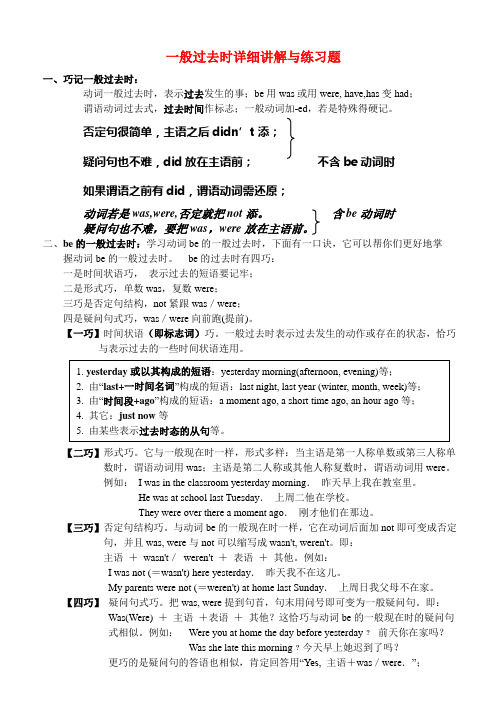
一般过去时详细讲解与练习题一、巧记一般过去时:动词一般过去时,表示过去发生的事;be 用was 或用were, have,has 变had ;谓语动词过去式,过去时间作标志;一般动词加-ed ,若是特殊得硬记。
否定句很简单,主语之后didn ’t 添; 疑问句也不难,did 放在主语前; 不含be 动词时如果谓语之前有did ,谓语动词需还原;动词若是was,were,否定就把not 添。
含be 动词时疑问句也不难,要把was ,were 放在主语前。
二、be 的一般过去时:学习动词be 的一般过去时,下面有一口诀,它可以帮你们更好地掌 握动词be 的一般过去时。
be 的过去时有四巧:一是时间状语巧, 表示过去的短语要记牢;二是形式巧,单数was ,复数were ;三巧是否定句结构,not 紧跟was /were ;四是疑问句式巧,was /were 向前跑(提前)。
【一巧】时间状语(即标志词)巧。
一般过去时表示过去发生的动作或存在的状态,恰巧 与表示过去的一些时间状语连用。
【二巧】形式巧。
它与一般现在时一样,形式多样:当主语是第一人称单数或第三人称单 数时,谓语动词用was ;主语是第二人称或其他人称复数时,谓语动词用were 。
例如: I was in the classroom yesterday morning . 昨天早上我在教室里。
He was at school last Tuesday . 上周二他在学校。
They were over there a moment ago . 刚才他们在那边。
【三巧】否定句结构巧。
与动词be 的一般现在时一样,它在动词后面加not 即可变成否定 句,并且was, were 与not 可以缩写成wasn't, weren't 。
即:主语 + wasn't / weren't + 表语 + 其他。
例如:I was not (=wasn't) here yesterday . 昨天我不在这儿。
完整版)一般过去时讲解及练习

完整版)一般过去时讲解及练习一般过去时是用来描述在确定的过去时间里所发生的动作或存在的状态。
常见的时间状语有yesterday、an hour ago、the other day、XXX、last night/week/month/year、a moment ago、a week ago、three years ago、just now和in the past等。
例如:“Where did you go just now?”(你刚才去哪了?)。
一般过去时的谓语动词形式为动词的过去式,一般在动词原形后加-ed。
例如:“I was tired last night.”(昨天晚上我很累)和“XXX.”(昨天我们参观了那个博物馆)。
一般过去时的构成有两种方式。
第一种是用was/were+形容词/名词等。
例如:“I was XXX.”(昨天我在家)和“Mr.Green was not a teacher last year.”(去年XXX不是一个老师)。
系动词be的过去式为am/is→was、are→were。
第一人称单数(I)和第三人称单数(he/she/it)用was,第二人称单数(you)和各人称复数(we/you/they)用were。
第二种是用实义动词的过去式+其他成分。
例如:“XXX.”(我妈妈昨天去购物了)和“His uncle worked in Beijing in 2014.”(他叔叔2014年在北京工作)。
一般过去时的句式有三种。
肯定句的形式是主语+was/were+其他或主语+实义动词的过去式+其他。
例如:“XXX.”(上周日我去探望了爷爷)和“I was not at school at this time yesterda y.”(昨天的这个时候我没在学校)。
否定句的形式是主语+did+not+实义动词的原形+其他。
例如:“XXX.”(上周我什么都没买)。
疑问句的形式是Was/Were+主语+其他?例如:“Was she at home yesterday?”(昨天她在家吗?)Did you have a good time last weekend。
七年级下册一般过去时讲解及练习题

七年级下册一般过去时讲解及练习题经典句型-How was your weekend?-Great,thanks.-What did you do last weekend?-I did my homework.Section A1. 表示“发生在过去的动作”,要用一般过去时,句中常含表示“过去”的时间。
一般过去时的结构:主语+V过去式。
翻译时加上“…了”。
(不管主语是“单数”还是“复数”,动词始终用“过去式”)练:(1) He _________ (go) to school on foot yesterday.(2) – What did Jim do?-- He _________ (go) to the movies.(3) We ___________ (not go) to the cinema last Sunday.2. –你上个周末做了什么?-- What did you do last weekend? (did引导,动词还原)--在星期天上午,我打了网球。
-- I played tennis on Sunday morning.拓展:时间前的介词用什么在上午/下午/晚上:in the morning/afternoon/evening在星期天上午/下午/晚上:on Sunday morning/afternoon/evening在上个星期天上午:/ last Sunday morning (前不用冠词)在上学的白天/晚上:on school days/nightson weekends 在周末on weekdays 在工作日3. –Tina的周末怎么样?-- How was Tina’s weekend?--它很棒:It was great.–它还不错:It was not bad.–它很糟糕:It was terrible.( ) 1--_____you busy last weekend?--Yes, I helped my mother clean the house and the garden.A WereB WasC DidD Are( ) 2– What did they do last weekend?- - They _______in the park.A went a boatB went to a boatC went boatingD took boating ( ) 3-How many ____did you see on the farm?A sheepsB sheepC cowD chicken( ) 4 –Did you have a good weekend?---Yes ,it was good. But I was kind of ______.A interestedB happyC tiredD excited( ) 5 Mary _____very late last night .A stayed upB sat downC woke upD put down( ) 6 Mike _____ in the swimming pool yesterday.A swimedB swimmedC swamD swims( ) 7 There isn’t ________ in the restaurant .特殊疑问句Where was he yesterday? What did they do yesterday?4. 动词的过去式和过去分词的规则变化①一般在动词词尾加ed 例: want →wanted②以e结尾的动词,只加d 例: live →lived③以辅音字母加y结尾的动词,改y为i,再加ed 例: study →studied④以重读闭音节结尾,末尾只有一个辅音字母,双写这一辅音字母,再加ed例: stop →stopped5.不规则动词过去式:am,is--was, are--were, do--did, see--saw, say-said, give-gave,get-got, go-went, come-came, have-had, eat-ate, take-took,run-ran, sing-sang, put-put, fly-flew,make-made, read-read, write-wrote, draw-drew, drink-drank,ride-rode, speak-spoke, sweep-swept, swim-swam, sit-sat练一练are go have do come take run becomesay leave look l ive stop carry hope trip call finish want are go do get comesay see put eat take read巧记动词过去时态巧记动词过去时态动词一般过去时,表示过去发生的事;be用was或用were, have, has变had;谓语动词过去式,过去时间坐标志;一般动词加-ed,若是特殊得硬记。
- 1、下载文档前请自行甄别文档内容的完整性,平台不提供额外的编辑、内容补充、找答案等附加服务。
- 2、"仅部分预览"的文档,不可在线预览部分如存在完整性等问题,可反馈申请退款(可完整预览的文档不适用该条件!)。
- 3、如文档侵犯您的权益,请联系客服反馈,我们会尽快为您处理(人工客服工作时间:9:00-18:30)。
辅导科目:英语
授课主题语法:一般过去时
1、熟悉一般过去时的基本结构教学目标运用概念和结构去解题
2、教学内容经典句型
-How was your weekend?
-Great,thanks.
-What did you do last weekend?
-I did my homework.
Section A
的时间。
过去”“表示发生在过去的动作”,要用一般过去时,句中常含表示“1. ”。
+V过去式。
翻译时加上“…了一般过去时的结构:主语”)过去式复数“”,动词始终用“还是单数不管主语是(“”(1) He _________ (go) to school on foot yesterday.
练:–(2) What did Jim do?
1
-- He _________ (go) to the movies.
(3) We ___________ (not go) to the cinema last Sunday.
) (did引导,动词还原-- What did you do last weekend? 2. –你上个周末做了什么?-- I played tennis on Sunday morning. --在星期天上午,我打了网球。
拓展:时间前的介词用什么in the morning/afternoon/evening
/晚上:在上午/下on Sunday morning/afternoon/evening晚上下在星期天上午) 前不用冠词( / last Sunday morning 在上个星期天上午:on school days/nights 晚上:在上学的白天/ 在工作日on weekdays 在周末on weekends
How was Tina's weekend?Tina的周末怎么样?-- 3. –It was great. --它很棒: not bad.–它还不错:It was terrible.它很糟糕:It was–
( ) 1--_____you busy last weekend?
--Yes, I helped my mother clean the house and the garden.
A Were
B Was
C Did
D Are
2
( ) 2–What did they do last weekend?
-- They _______in the park.
A went a boat
B went to a boat
C went boating
D took boating ( ) 3-How many ____did you see on the farm?
A sheeps
B sheep
C cow
D chicken
( ) 4 –Did you have a good weekend?
---Yes ,it was good. But I was kind of ______.
A interested
B happy
C tired
D excited
( ) 5 Mary _____very late last night .
A stayed up
B sat down
C woke up
D put down
( ) 6 Mike _____ in the swimming pool yesterday.
A swimed
B swimmed
C swam
D swims
( ) 7 There isn't ________ in the restaurant .
A something delicious
B anything delicious
C everything expensive
D nothing
expensive
( ) 8 The movie was ______ but ______.
A interested ; scared
B interested ; scary
C interesting ; scared
D interesting ;
scary
( ) 9 Did you see the boy _____ soccer on the playground just now ?
A played
B plays
C playing
D to play
语法一般过去式
His mother made some dumplings yesterday. 用法: ①过去某个时间发生的动作例:1Jim was 12 years old.
例:②过去某个时间存在的状态
③过去经常或反复发生的动作例:He often went to swim when he was a child.
2. 与一般过去时连用的时间状语常见的有:
Yesterday, last night, in 1990, once, two days ago, the day before yesterday , the 3
other day 几天前
一般过去时的四个基本句型 3.
do
be
谓语动词是谓语动词是TV yesterday. in the room yesterday. watched They He was肯定句TV yesterday.
He was not in the room didn't watch They 否定句yesterday.
TV yesterday? Was he in the room yesterday?
Did they watch一般疑句did.didn't.No, they Yes, he was. No, he wasn't. Yes, they
they do yesterday?
Where was he yesterday?
What did 特殊疑问句
4. 动词的过去式和过去分词的规则变化
例: want →wanted ①一般在动词词尾加ed
d e: liv
e →lived 例结尾的动词,只加②以
ed i,再加例: study →studied ③以辅音字母加y结尾的动词,改y为ed ④以重读闭音节结尾,末尾只有一个辅音字母,双写这一辅音字母,再加: stop →stopped例.不规则动词过去式:5 give-gave, see--saw, say-said, am,is--was, are--were, do--did,
take-took, eat-ate, come-came, have-had, get-got, go-went,
fly-flew,
put-put, sing-sang, run-ran,
drink-drank, write-wrote, draw-drew, make-made, read-read,
sit-sat sweep-swept, swim-swam, ride-rode, speak-spoke,
练一练
come take run go have do are become
trip stop carry hope live leave say
look
come get are want go do call finish eat see say put take read
4
动词一般过去时,表示过去发生的事;;were, have, has变hadbe 用was或用谓语动词过去式,过去时间坐标志;,若是特殊得硬记。
一般动词加-ed添;tdidn否定句很简单,主语之后'放在主语前;did 疑问句也不难,,谓语动词需还原;did如果谓语之前有添。
动词若是was, were,否定就把not
Homework
改写句子:、1Lucy did her homework at home.(改否定句)Lucy ________ _______ her homework at home.
)
(冰箱)、2He found some meat in the fridge.(变一般疑问句5
6
7
8
9
10。
